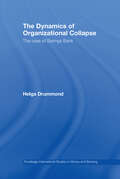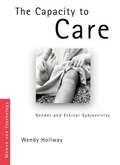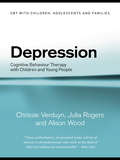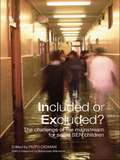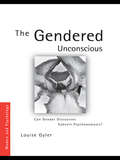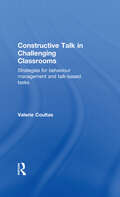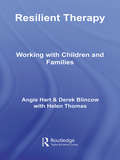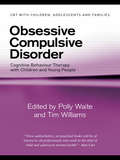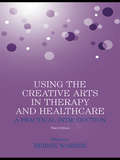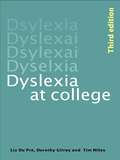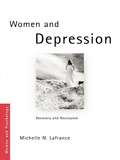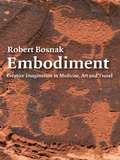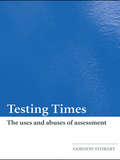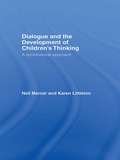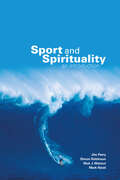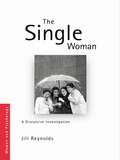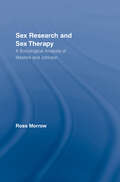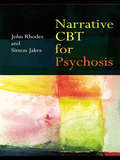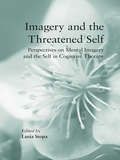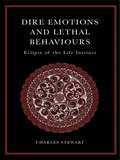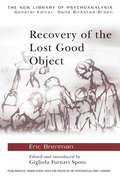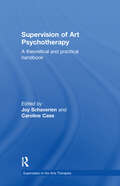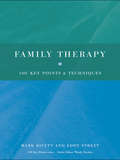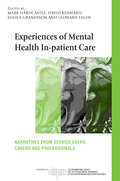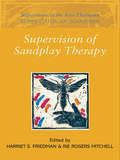- Table View
- List View
The Dynamics of Organizational Collapse: The Case of Barings Bank (Routledge International Studies In Money And Banking Ser. #Vol. 46)
by Helga DrummondThe collapse of Barings Bank was a commercial catastrophe that resonated worldwide, showing what kind of secrets can lie behind an apparently successful organization. Following Nick Leeson‘s arrest and subsequent conviction for fraud, investment banks anxiously reviewed their risk management controls to make sure that it could never happen a
The Capacity to Care: Gender and Ethical Subjectivity (Women and Psychology)
by Wendy HollwayWendy Hollway explores a subject that is largely absent from the topical literature on care. Humans are not born with a capacity to care, and this volume explores how this capacity is achieved through the experiences of primary care, gender development and later, parenting. In this book, the author addresses the assumption that the capacity to care is innate. She argues that key processes in the early development of babies and young children create the capability for individuals to care, with a focus on the role of intersubjective experience and parent-child relations. The Capacity to Care also explores the controversial belief that women are better at caring than men and questions whether this is likely to change with contemporary shifts in parenting and gender relations. Similarly, the sensitive domain of the quality of care and how to consider whether care has broken down are also debated, alongside a consideration of what constitutes a ‘good enough’ family. The Capacity to Care provides a unique theorization of the nature of selfhood, drawing on developmental and object relations psychoanalysis, as well as philosophical and feminist literatures. It will be of relevance to social scientists studying gender development, gender relations and the family as well as those interested in the ethics of care debate.
Depression: Cognitive Behaviour Therapy with Children and Young People (CBT with Children, Adolescents and Families)
by Chrissie Verduyn Julia Rogers Alison WoodIn recent years there has been an increase in research into childhood depression, and it is now recognised that depression can severely impair young people in many aspects of their life, school, peer and social relationships, and frequently persists into adulthood. Depression: Cognitive Behaviour Therapy with Children and Young People provides an accessible guide to recognising and treating depression in young people. Based on a successful manual developed for research trials, this book presents an overview of a cognitive behavioural model for working with this age group, as well as practical ideas about how to start therapy. Topics covered include: engaging young people setting goals for therapy cognitive behaviour assessment and formulation solutions for problems practitioners may face encouraging parents and agencies to support therapy. Depression includes case examples and practical tips to prepare the practitioner for working with young people. Information is presented in a readable and practical style making this book ideal for professionals working in child and adolescent mental health services, as well as those in training. It will also be a useful guide for people working in community services for young people. Online resources: The appendices of this book contain worksheets that can be downloaded free of charge to purchasers of the print version. Please visit the website to find out more about this facility
Included or Excluded?: The Challenge of the Mainstream for Some SEN Children
by Ruth CigmanIn a pamphlet published in 2005 Mary Warnock expressed concerns about some of the concepts that she had helped to introduce in the field of special education almost three decades earlier. She argued that the role of special schools was unclear and the pursuit of inclusion had become too ideological. This highly topical book suggests that distinctions should be made between kinds of special needs and the possibility addressed that some SEN children might be happier and more effective as learners within non-mainstream settings. Her call for a government review to investigate these problems raised its media profile, fuelling the debate. This book pulls together contributions from all sides of the argument. An essential read for anyone involved in special education as well as the philosophy and ethics of education this book truly breaks new ground.
The Gendered Unconscious: Can Gender Discourses Subvert Psychoanalysis? (Women and Psychology)
by Louise GylerFeminist interventions in psychoanalysis have often attempted either to subvert or re-frame the masculinist and phallocentric biases of Freud's psychoanalysis. This book investigates the nature of these interventions by comparing the status and treatment of women in two different psychoanalytic models: the Kleinian and the feminist models. It argues that, in fact, these interventions have historically tended to reinforce such biases by collapsing the distinction between the gendered minds of individuals and theories of gender. This investigation is framed by two steps. First, in assessing the position of women and the feminine in psychoanalysis, The Gendered Unconscious explores not only the ways they are represented in theory, but also how these representations function in practice. Secondly, this book uses a framework of a comparative dialogue to highlight the assumptions and values that underpin the theory and clinical practice in the two psychoanalytic models. This comparative critique concludes with the counter-intuitive claim that contemporary Kleinian theory may, in practice, hold more radical possibilities for the interests of women than the practices derived from contemporary psychoanalytic gender theory. This book is of significant interest to those studying the psychology of women, psychoanalytic studies, health psychology, sociology, gender studies and cultural studies. It will also be of interest to clinicians and candidates of professional psychotherapy and psychoanalytic training programmes.
Constructive Talk in Challenging Classrooms: Strategies for Behaviour Management and Talk-Based Tasks
by Valerie CoultasConstructive Talk in Challenging Classrooms gives the practising teacher advice on how to make learning fun through the use of ‘talk’ and collaborative group work. Using clear examples, tried and tested in some of the most challenging classrooms in inner city schools, the book offers practical and honest advice on both the difficulties and rewards that can be gained when employing all forms of talk-based teaching in the classroom. Packed with real examples of successful talk based lessons with children of all abilities and needs, this book will show teachers how they can succeed in overcoming problems of disruption and engage even the most difficult pupils in real learning through talk. The book shows that bringing the child's individual experience into a lesson through talk has huge emotional and psychological benefits – this can be particularly marked in classrooms where there are low levels of literacy, behaviour issues or where pupils’ first language is not English. The author argues that talk is vital for building positive relationships and essential for successful teaching, particularly in the difficult classrooms. This inspiring title is essential reading for any teacher interested in building trust and making learning fun and meaningful for all.
Resilient Therapy: Working with Children and Families
by Helen Thomas Angie Hart Derek BlincowWhilst much has been written about the identification of resilience in children and their families, comparatively little has been written about what practitioners can do to support those children and families who need the most pressing help. Resilient Therapy explores a new therapeutic methodology designed to help children and young people find ways to keep positive when living amidst persistent disadvantage. Using detailed case material from a range of contexts, the authors illustrate how resilient mechanisms work in complex situations, and how resilient therapy works in real-life situations. In addition to work with families, helping welfare organisations achieve greater resilience is also tackled. This book will be essential reading for practitioners working with children, adolescents and their families who wish to help their clients cope with adversity and promote resilience.
Obsessive Compulsive Disorder: Cognitive Behaviour Therapy with Children and Young People (CBT with Children, Adolescents and Families)
by Tim Williams Polly WaiteObsessive Compulsive Disorder (OCD) is characterised by a person's obsessive, distressing, intrusive thoughts and their related compulsions. It affects an estimated one percent of teenagers and has been detected in children as young as three years old. In this concise, accessible book experienced contributors provide detailed guidance on carrying out assessments and treatment for children and young people with OCD from a cognitive behavioural perspective. This approach has been developed from extensive research and clinical work with young people with OCD and associated problems. The book includes: an overview of OCD an introduction to CBT and its relevance to OCD in young people assessment and treatment methods case studies and clinical vignettes worksheets for use with the client. This straightforward text provides essential direction for practitioners and trainees in a range of professions including psychiatry, psychotherapy, counselling, nursing, education and social work. Online resources: The appendices of this book provide worksheets that can be downloaded free of charge to purchasers of the print version. Please visit the website to find out more about this facility.
Using the Creative Arts in Therapy and Healthcare: A Practical Introduction
by Bernie WarrenUsing the Creative Arts in Therapy and Healthcare provides a practical introduction to the uses of arts and other creative processes to promote health and encourage healing. This latest edition includes newly edited chapters from the original and second edition covering the therapeutic use of dance, drama, folklore and ritual, story telling and the visual arts. Information on guidelines, preparations and practical hints for leaders and facilitators has also been updated. New chapters provide an international perspective in the field of the arts and healthcare, and show how the artist can alleviate distress for patients through art, music and drama. Illustrated throughout with ideas and examples of how the arts can be used in a range of healthcare settings, this book will be essential reading for creative arts therapists and healthcare professionals throughout the world.
Dyslexia at College
by T. R. Miles Dorothy Gilroy Elizabeth Ann Du PreThis fully updated third edition contains practical and useful advice that will be invaluable for students with dyslexia, their parents and all of those involved in teaching and supporting them in their studies. Including the latest research into dyslexia, changes in legislation and information technology and the real-life experiences of six former Bangor students this book will: • guide students through the process of applying for university, suggesting strategies for general organisation and for particular aspects of study • outline how to get the best personally and academically from higher education • give practical advice on setting up and using support facilities (both human and technological) • be an accessible text for mainstream lecturers and tutors who need to be aware of the implications of the Disability Discrimination Act. New chapters include 'Dyslexia plus', giving information on dyspraxia, attention disorders, Asperger's syndrome, and the more controversial 'dyscalculia'. ‘Out of College and into Work’ gives advice for students on the challenges they face after graduation.
Women and Depression: Recovery and Resistance (Women and Psychology)
by Michelle N. LafranceWomen and Depression: Recovery and Resistance takes a welcome look at women’s experiences of living well after depression. Lafrance argues that the social construction of femininity is dangerous for women’s health, and ultimately, central to their experiences of depression. Beginning with a critical examination of the ways in which women’s depression is a product of the social, political, and interpersonal realities of their everyday lives, the analysis moves on to explore an often ignored aspect of women’s experience – how women manage to ‘recover’ and be well after depression. The book draws on extensive in-depth interviews with women who have been depressed, as well as on previous research and on analyses of representations of women’s health practices in the media. In this way Lafrance critically examines how women negotiate and actively resist hegemonic discourses of femininity in their struggles to recover from depression and be well. Threaded throughout the analysis is the exploration of a variety of subjects related to women’s distress and health, including: negotiating identity the medicalization of women’s misery women’s narratives of resistance the material and discursive context of women’s self-care In exploring the taken-for-granted aspects of women’s experiences, Lafrance sheds light on the powerful but often invisible constraints on women’s wellbeing, and the multiple and creative ways in which they resist these constraints in their everyday lives. These insights will be of interest to students and scholars of psychology, sociology, women’s studies, social work, counseling, and nursing.
Embodiment: Creative Imagination in Medicine, Art and Travel
by Robert BosnakDid you know that intentional dreaming has been used to solve life's problems? Embodiment: Creative Imagination in Medicine, Art and Travel sets out Robert Bosnak's practice of embodied imagination and demonstrates how he actually works with dreams and memories in groups. The book discusses various approaches to dreams, body and imagination, and combines this with a Jungian, neurobiological, relational and cultural analysis. The author's fascination with dreams, the most absolute form of embodied imagination, has caused him to travel all over the world. From his research he concludes that while dreaming everyone everywhere experiences dreams as embodied events in time and space while the dreamer is convinced of being awake; it is after waking into our specific cultural stories about dreaming that the widely differing attitudes towards dreams arise. By taking dreaming reality, not our waking interpretation of it, as the model for imagination, this book creates a paradigm shock and produces methods which can be applied in a wide variety of cultural settings. Through detailed case studies, professionals and students will find thorough discussions of: ways to flashback into dreams and memories while in a hypnagogic state of consciousness the practice of embodied imagination and its profound physical effects psyche as a self-organizing multiplicity of selves the nature of subjectivity the body as a theatre of sense memories the limitation of reason the process of dissociation the treatment of trauma This book discusses a variety of techniques which may be applied by health professionals to their patients and clients. It will also be of particular interest to Jungian and relational psychoanalysts, psychotherapists and clinical psychologists, as well as to artists, actors, directors, writers and other individuals who wish to explore the creative imagination.
Testing Times: The Uses and Abuses of Assessment
by Gordon StobartAssessment dominates our lives but its good intentions often produce negative consequences. An example that is central to this book is how current forms of assessment encourage shallow ‘for-the-test’ learning. It is true to say that as the volume of assessment increases, confidence in what it represents is diminishing. This book seeks to reclaim assessment as a constructive activity which can encourage deeper learning. To do this the purpose, and fitness-for–purpose, of assessments have to be clear. Gordon Stobart critically examines five issues that currently have high-profile status: intelligence testing learning skills accountability the ‘diploma disease’ formative assessment Stobart explains that these form the basis for the argument that we must generate assessments which, in turn, encourage deep and lifelong learning. This book raises controversial questions about current uses of assessment and provides a framework for understanding them. It will be of great interest to teaching professionals involved in further study, and to academics and researchers in the field.
Dialogue and the Development of Children's Thinking: A Sociocultural Approach
by Neil Mercer Karen LittletonThis book draws on extensive research to provide a ground-breaking new account of the relationship between dialogue and children’s learning development. It closely relates the research findings to real-life classrooms, so that it is of practical value to teachers and students concerned that their children are offered the best possible learning opportunities. The authors provide a clear, accessible and well-illustrated case for the importance of dialogue in children's intellectual development and support this with a new and more educationally relevant version of socio-cultural theory, which explains the fascinating relationship between dialogues and learning. In educational terms, a sociocultural theory that relates social, cultural and historical processes, interpersonal communication and applied linguistics, is an ideal way of explaining how school experience helps children learn and develop. By using evidence of how the collective construction of knowledge is achieved and how engagement in dialogues shapes children's educational progress and intellectual development, the authors provide a text which is essential for educational researchers, postgraduate students of education and teachers, and is also of interest to many psychologists and applied linguists.
Sport and Spirituality: An Introduction
by Simon Robinson Nick Watson Jim Parry Mark NestiSport science can quantify many aspects of human performance but the spiritual dimensions of sports experience cannot be fully understood through measurement. However, the spiritual experience of sport – be it described as ‘flow’, ‘transcendence’ or the discovery of meaning and value – is central both to our basic motivation to take part in sports, and to achieving success. Sport and Spirituality: An Introduction explores these human aspects of sports experience through the perspectives of sport psychology, philosophy, ethics, theology and religious studies. It includes discussions of: Spirituality in the postmodern era Spirituality, health and well-being Theistic and atheistic perspectives on sport and the spiritual Nature and transcendence – the mystical and sublime in outdoor sport Applied sport psychology and the existential Spiritual perspectives on pain, suffering and destiny Sport, the virtues, ethical development and the spirit of the game The Olympic Games and de Coubertin’s ideas of the ‘religio athletae’. This groundbreaking text will be a valuable resource for students of sport and exercise studies, sports coaching, physical education and sport and health psychology. This book should be read by all those interested in the preparation, performance and well-being of athletes.
The Single Woman: A Discursive Investigation (Women and Psychology)
by Jill ReynoldsThe increase in numbers of single people has been described as one of the greatest social phenomena of western society. Most women will spend periods of their lives alone, without a committed partner relationship. Yet there is still a degree of social stigma attached to this status. Single women are a crucial group for study in relation to perceived changes in family life and relationships. This book provides a new understanding of what is often taken-for-granted – female single identity. In an examination of extracts from her interviews with women aged 30 to 60 years and living alone, Jill Reynolds explores how women deal with this potentially stigmatized identity. She focuses on identity and self-representation through consideration of discourse and the conversational moves made by the participants. Her analysis highlights that the culturally available and familiar resources for understanding singleness are highly polarized. Single women weave their way through the extreme contrasts of a denigrated or an empowered identity. Thus, while most participants give very positive accounts, they also pay attention to widespread social expectations that success in life involves a long-term committed relationship. This book makes an important contribution to the understanding of the lives of single women and represents a challenge to the considerable literature on gender and family life which has inadequately theorized singleness. It will be of great interest to academics and students in social psychology, sociology, social work and social policy. It will also be of particular interest to students of gender studies, qualitative research, narrative studies, conversation analysis and discourse analysis.
Sex Research and Sex Therapy: A Sociological Analysis of Masters and Johnson (Routledge Advances in Sociology #Vol. 32)
by Ross MorrowGynaecologist William Howell Masters and psychologist Virginia Eshelman Johnson pioneered research into the nature of human sexual response and the diagnosis and treatment of sexual disorders and dysfunctions from 1957 until the 1990s. This book examines their influential scientific sex research and its groundbreaking implications for sex therapy and the study of human sexuality. Until now, these developments have been largely ignored in sociology. The book illuminates how Masters and Johnson have constructed their apparently scientific ideas about sexual function and dysfunction with reference to dominant Western discourses about sexuality. In addition, the book will explore some of the wider theoretical, conceptual and historical issues relating to the study of human sexuality. These will include a critical evaluation of conventional accounts of the history of the sociology of sex, particularly in the United States, major theoretical frameworks used in the study and understanding of human sexuality, and some of the key concepts underpinning sex research and sex therapy.
Narrative CBT for Psychosis
by John Rhodes Simon JakesDesigned to meet the complex needs of patients with psychosis, Narrative CBT for Psychosis combines narrative and solution-focused therapy with established techniques from CBT (cognitive behaviour therapy) into one integrated flexible approach. In this book John Rhodes and Simon Jakes bring the practitioner up-to-date, as treatment and practice evolve to draw on other therapeutic approaches, creating an approach which is client centred and non-confrontational. The book contains many tried and tested practical ideas for helping clients, with several chapters including detailed and illuminating case studies. Areas of discussion include: how to work with delusions, voices and visions working with core beliefs an exploration of narratives of past difficulties and traumas recovery and ending therapy Narrative CBT for Psychosis will be essential reading for all mental health professionals who deal with psychosis who wish to learn a new approach.
Imagery and the Threatened Self: Perspectives on Mental Imagery and the Self in Cognitive Therapy
by Lusia StopaImagery is important in cognitive therapy because images often trigger strong emotions, and imagery techniques such as imaginal reliving and imaginal rescripting are increasingly used in therapeutic treatments. Imagery and the Threatened Self considers the role that images of the self play in a number of common mental health problems and how these images can be used to help people to recover. Stopa and her contributors focus specifically on images of the self which are often negative and distorted and can contribute to both the cause and the progression of clinical disorders. The book includes chapters on current theories of the self and on imagery techniques used in therapy, alongside chapters that examine the role of self-images and how images can be used in the treatment of disorders including: social phobia post-traumatic stress disorder eating disorders depression bipolar disorder. Imagery and the Threatened Self is an original and innovative book that will appeal to both clinicians and students who are studying and practising cognitive therapy.
Dire Emotions and Lethal Behaviours: Eclipse of the Life Instinct
by Charles StewartDire Emotions and Lethal Behaviours explores the primary motivational system in human beings. Based on the work of C. G. Jung, James Hillman, Louis Stewart and Silvan Tomkins, Charles Stewart investigates the psychology of the innate affects, with a focus towards the emotional motivation of adolescents and young adults who have killed others, themselves, or both. It is suggested that social isolation, dissociation of the personality, unbearable emotions, and possession by affects are necessary conditions for both homicide and suicide. Stewart argues that these conditions result from deep-seated emotional psychopathology which involves both the positive affects of the life instinct - Interest and Joy, and the crisis affects - Fear, Anguish, Anger, and Shame/Contempt. Illustrated throughout with case studies of individuals who have committed homicide, suicide, or both, Dire Emotions and Lethal Behaviours aims to discover the emotional motivations for such behaviours so that through education and psychological treatment, such tragic outcomes can be prevented. This book will be of interest to professionals and students in the fields of mental health and criminal justice.
Recovery of the Lost Good Object (The New Library of Psychoanalysis)
by Eric BrenmanRecovery of the Lost Good Object brings together the hugely influential papers and seminars of Eric Brenman, revealing his impact on the development of psychoanalysis and allowing a better understanding of his distinctive voice amongst post-Kleinian analysts. Gathered together for the first time in one volume, Eric Brenman's papers give the reader a unique insight into the development of his clinical and theoretical thinking. They highlight many issues which are relevant to the present debate about psychoanalytic technique, including: The Narcissism of the Analyst Hysteria The Recovery of the Good Object Relationship Meaning and Meaningfulness Cruelty and Narrowmindedness The Value of Reconstruction in Adult Psychoanalysis The second half of the book documents three of the clinical seminars and covers the transgenerational transmission of trauma, the analysis of borderline pathology and the psychoanalytical approach to severely deprived patients. This collection will be welcomed by all psychoanalysts and psychotherapists, and other members of the helping professions interested in investigating the valuable contribution that Eric Brenman has made to contemporary psychoanalysis.
Supervision of Art Psychotherapy: A Theoretical and Practical Handbook (Supervision in the Arts Therapies)
by Caroline Case Joy SchaverienSupervision of Art Psychotherapy will be an inspiration for advanced practitioners and students in training. It is the first book to formulate a unique theoretical base to current practice in art psychotherapy supervision. A central theme is the nature of the image in supervision, defining its difference from other forms of supervision in the mental health professions. Clinical practice is brought to life through vivid vignettes from diverse settings with a variety of client groups. part I establishes a theoretical base, introducing innovations in practice and addressing complex clinical issues in child and adult work. Topics include the narrative of imagery in supervision, enchantment, ambivalence, a topographical approach, engagement in supervision, and working with the network in art psychotherapy with children part II focuses on supervision in groups addressing training, difference and peer group image consultation, as well as supervision of experienced practitioners part III explores theory related to purposes and challenges in supervision and research. A vital contribution to the literature in the context of Continuing Professional Development, this volume establishes the image as central in the supervision of art psychotherapists. It brings the experience of the artist in the psychotherapist into the frame, provoking questions about the meaning of images and image making in supervision.
Family Therapy: 100 Key Points and Techniques (100 Key Points)
by Mark Rivett Eddy StreetFamily therapy is increasingly recognised as one of the evidence based psychotherapies. In contemporary therapeutic practice, family therapy is helpful across the age span and for distress caused by family conflict, trauma and mental health difficulties. Because of this, many psychotherapists integrate elements of family therapy within their approaches. Family Therapy: 100 Key Points and Techniques provides a concise and jargon-free guide to 100 of the fundamental ideas and techniques of this approach. Divided into helpful sections, it covers: Family therapy theory Essential family therapy practice Using family therapy techniques Common challenges in family therapy Contemporary debates and issues Self issues for family therapists. Family Therapy: 100 Key Points and Techniques is an invaluable resource for psychotherapists and counsellors in training and in practice. As well as appealing to established family therapists, this latest addition to the 100 Key Points series will also find an audience with other mental health professionals working with families and interested in learning more about family therapy techniques.
Experiences of Mental Health In-patient Care: Narratives From Service Users, Carers and Professionals (The International Society for Psychological and Social Approaches to Psychosis Book Series)
by David Kennard Sheila Grandison Mark Hardcastle Leonard FaginCommended in the Mental Health category of the 2008 BMA Medical Book Competition. This book offers an insight into the experience of psychiatric in-patient care, from both a professional and a user perspective. The editors highlight the problems in creating therapeutic environments within settings which are often poorly resourced, crisis driven and risk aversive. The contributors argue that for change to occur there needs first of all to be a genuine appreciation of the experiences of those involved in the unpredictable, anxiety-arousing and sometimes threatening environment of the psychiatric ward. Each chapter comprises a personal account of in-patient care by those in the front line: people who have been admitted to a psychiatric ward; their relatives; or those that provide the care. These accounts are followed by two commentaries written from different perspectives, suggesting lessons that can be learnt to improve the quality of care. Experiences of Mental Health In-patient Care will be useful for all mental health professionals, including mental health nurses, psychiatrists, clinical psychologists, occupational therapists, arts therapists, social workers and trainees, as well as service users and carers organisations.
Supervision of Sandplay Therapy (Supervision in the Arts Therapies)
by Rie Mitchell Harriet FriedmanSupervision of Sandplay Therapy, the first book on this subject, is an internationally-based volume that describes the state of the art in supervision of sandplay therapy. Recognizing that practitioners are eager to incorporate sandplay therapy into their practice, Harriet Friedman and Rie Rogers Mitchell respond to the need for new information, and successfully translate the theories of sandplay therapy into supervision practice. The book provides a meaningful connection and balance between theoretical principles, practical application, and ongoing therapeutic encounter involved in sandplay. Divided into six sections, contributors cover: original supervision models contemporary supervision models special challenges in supervision international sandplay supervision supervision of special groups connections with other arts therapies. Supervision of Sandplay Therapy expands the vision of what is possible in supervision and will be vital reading for those studying supervision and sandplay therapy, as well as for those wanting to provide a depth-oriented approach during supervision.
